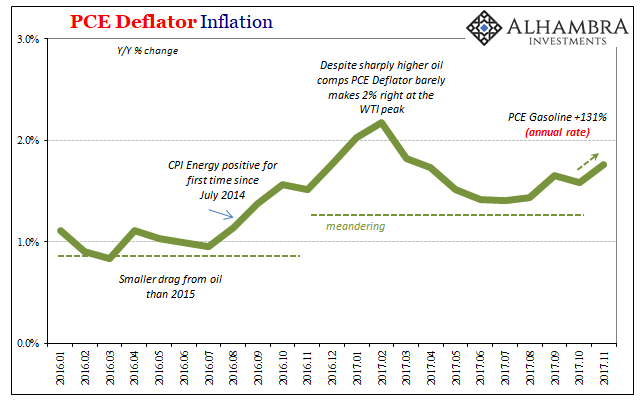
Authored by Jeffrey Snider via Alhambra Investment Partners,
When Janet Yellen spoke at her regular press conference following the FOMC decision in September 2017 to begin reducing the Fed’s balance sheet, the Chairman was forced to acknowledge that while the unemployment rate was well below what the central bank’s models view as inflationary it hadn’t yet shown up in the PCE Deflator.
Of course, this was nothing new since policymakers had been expecting accelerating inflation since 2014.
In the interim, they have tried very hard to stretch the meaning of the word “transitory” into utter meaninglessness; as in supposedly non-economic factors are to blame for this consumer price disparity, but once they naturally dissipate all will be as predicted according to their mandate.
That is, actually, exactly what Ms. Yellen said in September, unusually coloring her assessment some details as to those “transitory” issues:
For quite some time, inflation has been running below the Committee’s 2 percent longer-run objective. However, we believe this year’s shortfall in inflation primarily reflects developments that are largely unrelated to broader economic conditions. For example, one-off reductions earlier this year in certain categories of prices, such as wireless telephone services, are currently holding down inflation, but these effects should be transitory. Such developments are not uncommon and, as long as inflation expectations remain reasonably well anchored, are not of great concern from a policy perspective because their effects fade away.
Appealing to Verizon’s reluctant embrace of unlimited data plans for cellphone service was more than a little desperate on her part. Even if that was the primary reason for the PCE Deflator’s continued miss, it still didn’t and doesn’t necessarily mean what telecoms were up to was some non-economic trivia.
Over the past few years, consumers have been hit with almost regular (not “residual seasonality”) shocks to incomes that seem to be increasing in intensity as well as duration. These are, in effect, downturns within a downturn; short run drops or contractions inside an already lost decade. Acceleration of cheap might actually be the most logical of outcomes.
Rather than dismiss these continued problems in favor of fanciful bias towards monetary policy, it was of a far more scientific basis to wonder whether the Fed knows anything about inflation.
A lot has changed in official terms between September and December, which is to say in terms of inflation nothing changed. There is as yet no acceleration in the PCE Deflator (or CPI) that isn’t someway connected to oil price effects. In November 2017, the BEA calculates that consumer prices rose by 1.76% year-over-year, up from 1.59% in October as gasoline prices rose 131% (month-over-month, annual rate).
[image]https://www.alhambrapartners.com/wp-content/uploads/2017/12/ABOOK-Dec-2017-PCE-Real-DPI-per-Capita-1.png[/image]
Core rates that strip out energy prices, such as the Dallas Fed’s trimmed mean, continue to undershoot and therefore suggest no momentum and zero upon which to base expectations for acceleration. It’s not nothing that monetary policy has missed its target for sixty-five out of the last sixty-seven months, and ninety of the past 110 months going back to October 2008 and the botched monetary response to Lehman and everything before it.
[image]https://www.alhambrapartners.com/wp-content/uploads/2017/12/ABOOK-Dec-2017-PCE-Deflator-Corse.png[/image]
Because of all that within the realm of inflation, meaning the monetary system, it has been more than fair or reasonable to ask whether economists really know what they are doing. Up until 2016, that was a question you weren’t allowed to consider unless well outside of the mainstream. Since then, more and more policymakers are actually asking of themselves the same idea.
Having failed all throughout 2017, the year almost completely over, Janet Yellen’s final press conference for December, then, was subtly changed from the prior one to at least admit that maybe they really don’t know – trying hard not to make too much of a big deal about it.
We continue to believe that this year’s surprising softness in inflation primarily reflects transitory developments that are largely unrelated to broader economic conditions. As a result, we still expect inflation will move up and stabilize around 2 percent over the next couple of years. Nonetheless, as I’ve noted previously, our understanding of the forces driving inflation is imperfect.
As a final official act, Yellen downgraded from “definitely transitory” to “imperfect understanding.” This matters a great deal, for if their grasp of basic economic factors is this flawed (just an 18% hit rate in nearly 10 years) there’s likely far more gone wrong than just the price effects of unlimited wireless data.
[image]https://www.alhambrapartners.com/wp-content/uploads/2017/12/ABOOK-Dec-2017-Yield-Curve-Where-It-Lands.png[/image]
[image]https://www.alhambrapartners.com/wp-content/uploads/2017/12/ABOOK-Dec-2017-Inflation-Expectations-CPI.png[/image]